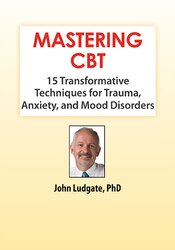
×

CBT remains a cornerstone in modern therapeutic practices due to its profound impact on mental health and well-being.
Picture this invigorating workshop as your opportunity to fill up on fresh CBT techniques and state-of-the-art interventions to ensure success with even your biggest therapeutic challenges.
From cognitive restructuring to exposure therapy, mindfulness to behavioral activation, and so much more, this comprehensive workshop will equip you with a versatile toolkit for almost any therapeutic hurdles you encounter.
Under the skilled guidance of esteemed CBT expert and author, Dr. John Ludgate, you will learn how to seamlessly integrate and apply these techniques in a way that aligns perfectly with your clients’ needs.
Whether you’re a seasoned pro or a novice ready to make an impact, you will learn to:
Using didactic material, case demonstrations, experiential exercises, and worksheets, this paradigm-shifting workshop will cover both core competencies and integrative techniques and interventions to ensure positive outcomes.
Register now and prepare to take your practice to the next level!
All members of the PESI, Inc. planning committee have provided disclosures of financial relationships with ineligible organizations and any relevant non-financial relationships prior to planning content for this activity. None of the committee members had relevant financial relationships with ineligible companies or other potentially biasing relationships to disclose to learners. For speaker disclosures, please see the faculty biography.
Continuing education credit information is coming soon for this live webcast.

John Ludgate, PhD, is a licensed clinical psychologist who has worked as a psychotherapist for almost 30 years. He trained at the Center for Cognitive Therapy in Philadelphia under Dr. Aaron Beck, the founder of Cognitive Therapy, and is a Founding Fellow of the Academy of Cognitive Therapy. He subsequently became assistant director of training at Dr. Beck’s Center. His current practice consists largely of treating clients referred with mood problems and/or anxiety conditions at the Cognitive-Behavioral Therapy Center of Western North Carolina in Ashville, North Carolina.
John is a native of southern Ireland and obtained a master’s degree in clinical psychology from the University of Edinburgh in Scotland, and a PhD from Trinity College, Dublin, Ireland in 1990. In the early 1990s, Dr. Ludgate was a research clinical psychologist at the University of Oxford in England and served as cognitive therapist in several outcome studies of panic disorder, agoraphobia, social phobia and hypochondriasis.
He authored Cognitive Behavioral Therapy and Relapse Prevention for Depression and Anxiety (Professional Resources Press, 2009) and was co-editor with Wright, Thase and Beck of Cognitive Therapy with Inpatients: Developing a Cognitive Milieu (Guilford Press, 1993). His other books include Overcoming Compassion Fatigue (PESI, 2014 co-authored with Martha Teater) and The CBT Couples Toolbox (PESI, 2018). He has written numerous journal articles and book chapters in the field of Cognitive Behavior for Anxiety and Depression. He has presented many seminars and workshops on cognitive behavioral approaches, both nationally and internationally.
Speaker Disclosures:
For live CE credit, you must watch the live webcast in its entirety at its scheduled time and complete the CE quiz and evaluation within one week. You will have access for 90 days after the program for review.
Please note: There will be a 70-minute lunch and two 15-minute breaks; one in the morning and one in the afternoon. Lunch and break times will be announced by the speaker and at their discretion. A more detailed schedule is available upon request.
Visit our FAQ page at https://www.pesicanada.ca/faq or contact us at https://www.pesicanada.ca/contact-us.
Optimize CBT Practice: Strategies for Success
Understand Client Suitability
Navigate complex clinical situations
Maintain Structure and Flexibility
Prevent Relapse and Promote Wellness
Top CBT Techniques for Transformation
Elevate Therapist Effectiveness
Satisfaction Guarantee
Your satisfaction is our goal and our guarantee. Concerns should be addressed to info@pesicanada.com.
Please wait ...